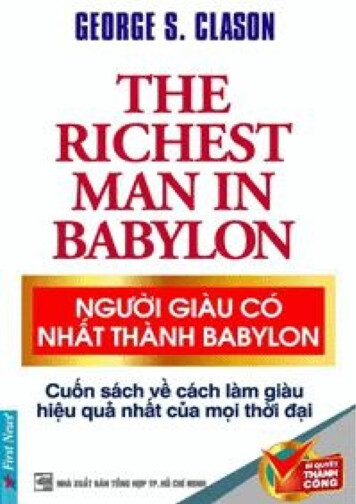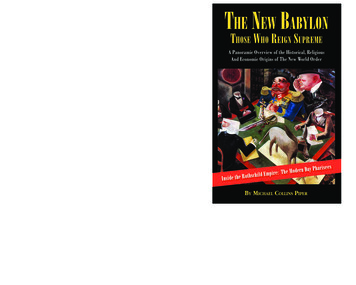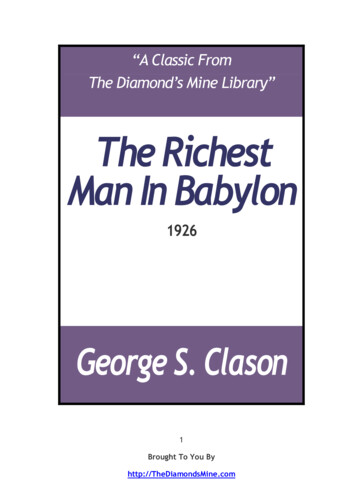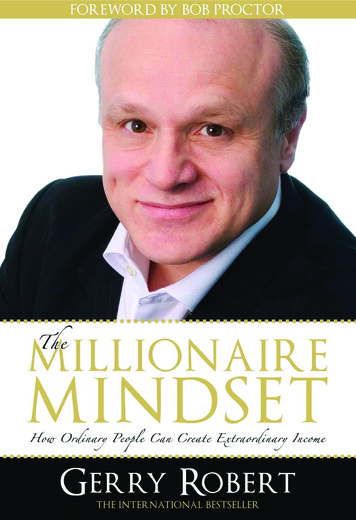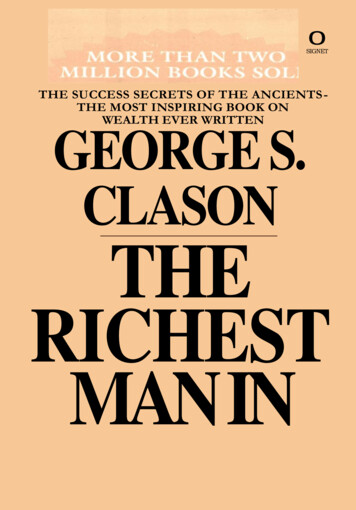
Transcription
0SIGNETTHE SUCCESS SECRETS OF THE ANCIENTS THE MOST INSPIRING BOOK ONWEALTH EVER WRITTENGEORGE S.CLASONTHERICHESTMANIN
BABYLON
Money is the medium by which earthly success is measured.Money makes possible the enjoyment of thebest the earth affords.Money is plentiful for those who understandthe simple laws which govern its acquisition.Money is governed today by the same lawswhich controlled it when prosperous menthronged the streets of Babylon, six thousandyears ago.
Lo, MONEY IS PLENTIFULFOR THOSE WHO UNDERSTANDTHE SIMPLE RULES OF ITS ACQUISITION1.2.3.4.5.6.Start thy purse to fatteningControl thy e xpendituresMake thy gold multiplyGuard thy treasures from lossMake of thy dwelling a profitable investmentInsure a future income7. Increase thy ability to earn —The Richest Manin BabylonREAD ON FOR MORE!
"What can a book written in the 1920s tell moderninvestors about their finances? A whole lot if it'sGeorge Clason's delightful set of parables that ex plain the basics of money. This is a great gift for agraduate or anyone who seems baffled by the worldof finance and a wonderful, refreshing read for eventhe most experienced investor." —Los Angeles TimesAhead of you stretches your future, like a roadleading into the distance. Along that road are ambitions you wish to accomplish . . . desires you wishto gratify.To bring your ambitions and desires to fulfilment,you must be successful with money. Use the financialprinciples made clear in the pages that follow. Letthem guide you away from the stringency of a leanpurse to that fuller, happier life a full purse makespossible.Like the law of gravity, these laws of money areuniversal and unchanging. May they prove to be foryou, as they have proven to so many others, a surekey to a fat purse, larger bank balances and gratifyingfinancial progress.
THERICHESTMAN INBABYLONGeorge S. ClasonA SIGNET BOOK
SIGNETPublished by New American Library, a division ofPenguin Putnam Inc., 375 Hudson Street,New York, New York 10014, U.S.A.Penguin Books Ltd, 80 Strand,London WC2R ORL, EnglandPenguin Books Australia Ltd, 250 Camberweil Road,Camberwell, Victoria 3124, AustraliaPenguin Books Canada Ltd, 10 Alcorn Avenue,Toronto, Ontario, Canada M4V 3B2Penguin Books (N.Z.) Ltd, 182-190 Wairau Road,Auckland 10, New ZealandPenguin Books Ltd, Registered Offices:Harmondsworth, Middlesex, EnglandPublished by Signet, an imprint of New American Library,a division of Penguin Putnam Inc. Previously published in a Dutton edition.First Signet Printing, February 198810 9 8 7 6 5 4 3Copyright George S. Clason, 1926, 1930, 1931, 1932, 1936, 1937, 1940, 1946,1947, 1954, 1955All rights reservedREGISTERED TRADEMARK—MARCA REG1 STRADAPrinted in the United States of AmericaWithout limiting the rights under copyright reserved above, no part ofthis publication may be reproduced, stored in or introduced into aretrieval system, or transmitted, in any form, or by any means (electronic,mechanical, photocopying, recording, or otherwise), without the prior writtenpermission of both the copyright owner and the above publisher of thisbook.BOOKS ARE AVAILABLE AT QUANTITY DISCOUNTS WHEN USED TOPROMOTEPRODUCTS OR SERVICES. FOR INFORMATION PLEASE WRITE TOPREMIUMMARKETING DIVISION, PENGUIN PUTNAM INC., 375 HUDSON STREET, NEWYORK, NEW YORK 10014.If you purchased this book without a cover you should be aware that thisbook is stolen property. It was reported as "unsold and destroyed"to the publisher and neither the author nor the publisher has receivedany payment for this "stripped book."
ContentsForewordThe Man Who Desired Goldix1The Richest Man in BabylonSeven Cures for a Lean Purse922Meet the Goddess of Good LuckThe Five Laws of GoldThe Gold Lender of BabylonThe Walls of BabylonThe Camel Trader of BabylonThe Clay Tablets from BabylonThe Luckiest Man in Babylon4359748994106118An Historical Sketch of Babylon138
ForewordOur prosperity as a nation depends upon the personalfinancial prosperity of each of us as individuals.This book deals with the personal successes of eachof us. Success means accomplishments as the resultof our own efforts and abilities. Proper preparationis the key to our success. Our acts can be no wiserthan our thoughts. Our thinking can be no wiser thanour understanding.This book of cures for lean purses has been termeda guide to financial understanding. That, indeed, isits purpose: to offer those who are ambitious for financial success an insight which will aid them toacquire money, to keep money and to make theirsurpluses earn more money.In the pages which follow, we are taken back toBabylon, the cradle in which was nurtured the basicprinciples of finance now recognized and used, theworld over.To new readers the author is happy to extend thewish that its pages may contain for them the sameix
x FOREWORDinspiration for growing bank accounts, greater financial successes and the solution of difficult personal financial problems so enthusiastically reportedby readers from coast to coast.To the business executives who have distributedthese tales in such generous quantities to friends, relatives, employees and associates, the author takesthis opportunity to express his gratitude. No endorsement could be higher than that of practical menwho appreciate its teachings because they, themselves, have worked up to important successes byapplying the very principles it advocates.Babylon became the wealthiest city of the ancientworld because its citizens were the richest people oftheir time. They appreciated the value of money.They practiced sound financial principles in acquiringmoney, keeping money and making their money earnmore money. They provided for themselves what weall desire . . . incomes for the future.G. S. C.
THERICHESTMAN INBABYLON
The Man WhoDesired GoldBansir, the chariot builder of Babylon, was thoroughly discouraged. From his seat upon the low wallsurrounding his property, he gazed sadly at his simplehome and the open workshop in which stood apartially completed chariot.His wife frequently appeared at the open door. Herfurtive glances in his direction reminded him that themeal bag was almost empty and he should be atwork finishing the chariot, hammering and hewing,polishing and painting, stretching taut the leatherover the wheel rims, preparing it for delivery so hecould collect from his wealthy customer.Nevertheless,' his fat, muscular body sat stolidlyupon the wall. His slow mind was struggling patiently with a problem for which he could find noanswer. The hot, tropical sun, so typical of this valleyof the Euphrates, beat down upon him mercilessly.Beads of perspiration formed upon his brow andtrickled down unnoticed to lose themselves in thehairy jungle on his chest.
2 THE RICHEST MAN IN BABYLONBeyond his home towered the high terraced wallssurrounding the king's palace. Nearby, cleaving theblue heavens, was the painted tower of the Templeof Bel. In the shadow of such grandeur was his simple home and many others far less neat and wellcared for. Babylon was like this—a mixture of grandeur and squalor, of dazzling wealth and direst poverty, crowded together without plan or system withinthe protecting walls of the city.Behind him, had he cared to turn and look, thenoisy chariots of the rich jostled and crowded asidethe sandaled tradesmen as well as the barefootedbeggars. Even the rich were forced to turn into thegutters to clear the way for the long lines of slavewater carriers, on the "king's business," each bearinga heavy goatskin of water to be poured upon thehanging gardens.Bansir was too engrossed in his own problem tohear or heed the confused hubbub of the busy city.It was the unexpected twanging of the strings froma familiar lyre that aroused him from his reverie. Heturned and looked into the sensitive, smiling face ofhis best friend—Kobbi, the musician."May the Gods bless thee with great liberality, mygood friend," began Kobbi with an elabourate salute."Yet, it does appear they have already been so generous thou needest not to labour. I rejoice with thee inthy good fortune. More, I would even share it withthee. Pray, from thy purse which must be bulgingelse thou wouldst be busy in yon shop, extract buttwo humble shekels and lend them to me until after
the noblemen's feast this night. Thou wilt not missthem ere they are returned.""If I did have two shekels," Bansir respondedgloomily, "to no one could I lend them—not even to1
4 THE RICHEST MAN IN BABYLONyou, my best of friends; for they would be my fortune—my entire fortune. No one lends his entire fortune, not even to his best friend.""What," exclaimed Kobbi with genuine surprise."Thou hast not one shekel in thy purse, yet sit likea statue upon a wall! Why not complete that chariot?How else canst thou provide for thy noble appetite?'Tis not like thee, my friend. Where is thy endlessenergy? Doth something distress thee? Have theGods brought to thee troubles?""A torment from the Gods it must be," Bansiragreed. "It began with a dream, a senseless dream,in which I thought I was a man of means. From mybelt hung a handsome purse, heavy with coins. Therewere shekels which I cast with careless freedom tothe beggars; there were pieces of silver with which Idid buy finery for my wife and whatever I did desirefor myself; there were pieces of gold which made mefeel assured of the future and unafraid to spend thesilver. A glorious feeling of contentment was withinme! You would not have known me for thy hardworking friend. Nor wouldst have known my wife,so free from wrinkles was her face and shining withhappiness. She was again the smiling maiden of ourearly married days.""A pleasant dream, indeed," commented Kobbi,"but why should such pleasant feelings as it arousedturn thee into a glum statue upon the wall?""Why, indeed! Because when I awoke and remembered how empty was my purse, a feeling of rebellion swept over me. Let us talk it over together, for,as the sailors do say, we ride in the same boat, wetwo. As youngsters, we went together to the prieststo learn wisdom. As young men, we shared each other's pleasures. As grown men, we have always been
The Man Who Desired Gold 5close friends. We have been contented subjects of ourkind. We have been satisfied to work long hours andspend our earnings freely. We have earned muchcoin in the years that have passed, yet to know thejoys that come from wealth, we must dream aboutthem. Bah! Are we more than dumb sheep? We livein the richest city in all the world. The travellers dosay none equals it in wealth. About us is much display of wealth, but of it we ourselves have naught.After half a lifetime of hard labour, thou, my best offriends, hast an empty purse and sayest to me, 'MayI borrow such a trifle as two shekels until after thenoblemen's feast this night?' Then, what do I reply?Do I say, 'Here is my purse; its contents will I gladlyshare?' No, I admit that my purse is as empty asthine. What is the matter? Why cannot we acquiresilver and gold—more than enough for food androbes?"Consider, also, our sons," Bansir continued, "arethey not following in the footsteps of their fathers?Need they and their families and their sons and theirsons' families live all their lives in the midst of suchtreasurers of gold, and yet, like us, be content to banquetupon sour goat's milk and porridge?""Never, in all the years of our friendship, didstthou tal k like this b ef or e, Bansir . " Ko bb i waspuzzled."Never in all those years did I think like this before. From early dawn until darkness stopped me, Ihave laboured to build the finest chariots any mancould make, soft-heartedly hoping some day theGods would recognize my worthy deeds and bestowupon me great prosperity. This they have never done.At last, I realize this they will never do. Therefore,my heart is sad. I wish to be a man of means. I wish
6 THE RICHEST MAN IN BABYLONto own lands and cattle, to have fine robes and coinsin my purse. I am willing to work for these thingswith all the strength in my back, with all the skill inmy hands, with all the cunning in my mind, but Iwish my labours to be fairly rewarded. What is thematter with us? Again I ask you! Why cannot wehave our just share of the good things so plentiful forthose who have the gold with which to buy them?""Would I know an answer!" Kobbi replied. "Nobetter than thou am I satisfied. My earnings from mylyre are quickly gone. Often must I plan and schemethat my family be not hungry. Also, within my breastis a deep longing for a lyre large enough that it maytruly sing the strains of music that do surge throughmy mind. With such an instrument could I makemusic finer than even the king has heard before?""Such a lyre thou shouldst have. No man in allBabylon could make it sing more sweetly; couldmake it sing so sweetly, not only the king but theGods themselves would be delighted. But how mayest thou secure it while we both of us are as poor asthe king's slaves? Listen to the bell! Here they come."He pointed to the long column of half-naked, sweatingwater bearers plodding labouriously up the narrowstreet from the river. Five abreast they marched, eachbent under a heavy goatskin of water."A fine figure of a man, he who doth lead them."Kobbi indicated the wearer of the bell who marchedin front without a load. "A prominent man in hisown country, 'tis easy to see:""There are many good figures in the line," Bansiragreed, "as good men as we. Tall, blond men fromthe north, laughing black men from the south, littlebrown men from the nearer countries. All marchingtogether from the river to the gardens, back and
The Man Who Desired Gold 7forth, day after day, year after year. Naught of happiness to look forward to. Beds of straw upon whichto sleep—hard grain porridge to eat. Pity the poorbrutes, Kobbi !""Pity them I do. Yet, thou dost make me see howlittle better off are we, free men though we callourselves.""That is truth, Kobbi, unpleasant thought though itbe. We do not wish to go on year after year living slavishlives. Working, working, working! Getting nowhere.""Might we not find out how others acquire goldand do as they do?" Kobbi inquired."Perhaps there is some secret we might learn if webut sought from those who knew," replied Bansirthoughtfully."This very day," suggested Kobbi, "I did pass ourold friend, Arkad, riding in his golden chariot. ThisI will say, he did not look over my humble head asmany in his station might consider his right. Instead,he did wave his hand that all onlookers might seehim pay greetings and bestow his smile of friendshipupon Kobbi, the musician.""He is claimed to be the richest man in all Babylon," Bansir mused."So rich the king is said to seek his golden aid inaffairs of the treasury," Kobbi replied."So rich," Bansir interrupted, "I fear if I shouldmeet him in the darkness of the night, I should laymy hands upon his fat wallet.""Nonsense," reproved Kobbi, "a man's wealth isnot in the purse he carries. A fat purse quickly empties if there be no golden stream to refill it. Arkadhas an income that constantly keeps his purse full,no matter how liberally he spends.""Income, that is the thing," ejaculated Bansir. "I
The Man Who Desired Gold 8wish an income that will keep flowing into my pursewhether I sit upon the wall or travel to far lands.Arkad must know how a man can make an incomefor himself. Dost suppose it is something he couldmake clear to a mind as slow as mine?""Methinks he did teach his knowledge to his son,Nomasir," Kobbi responded. "Did he not go to Nineveh and, so it is told at the inn, become, withoutaid from his father, one of the richest men in thatcity?""Kobbi, thou bringest to me a rare thought." Anew light gleamed in Bansir's eyes. "It costs nothingto ask wise advice from a good friend and Arkadwas always that. Never mind though our purses beas empty as the falcon's nest of a year ago. Let thatnot detain us. We are weary of being without goldin the midst of plenty. We wish to become men ofmeans. Come, let us go to Arkad and ask how we,also, may acquire incomes for ourselves.""Thou speakest with true inspiration, Bansir. Thoubringeth to my mind a new understanding. Thoumakest me to realize the reason why we have neverfound any measure of wealth. We never sought it.Thou hast laboured patiently to build the staunchestchariots in Babylon. To that purpose was devotedyour best endeavours. Therefore, at it thou didst succeed. I strove to become a skilful lyre player. And,at it I did succeed."In those things toward which we exerted our bestendeavours we succeeded. The Gods were content tolet us continue thus. Now, at last, we see a light,bright like that from the rising sun. It biddeth us tolearn more that we may prosper more. With a newunderstanding we shall find honourable ways to accomplish our desires."
9 THE RICHEST MAN IN B ABYLON"Let us go to Arkad this very day," Bansir urged."Also, let us ask other friends of our boyhood days, .who have fared no better than ourselves, to join usthat they, too, may share in his wisdom.""Thou wert ever thus thoughtful of thy friends,Bansir. Therefore hast thou many friends. It shall beas thou sayest. We go this day and take them withus."
The Richest Man inBabylonIn old Babylon there once lived a certain very richman named Arkad. Far and wide he was famed forhis great wealth. Also was he famed for his liberality.He was generous in his charities. He was generouswith his family. He was liberal in his own expenses.But nevertheless each year his wealth increased morerapidly than he spent it.And there were certain friends of younger dayswho came to him and said: "You, Arkad, are morefortunate than we. You have become the richest manin all Babylon while we struggle for existence. Youcan wear the finest garments and you can enjoy therarest foods, while we must be content if we canclothe our families in raiment that is presentable andfeed them as best we can."Yet, once we were equal. We studied under thesame master. We played in the same games. And inneither the studies nor the games did you outshineus. And in the years since, you have been no morean honourable citizen than we.
10 THE RICHEST MAN IN BABYLON"Nor have you worked harder or more faithfully,insofar as we can judge. Why, then, should a ficklefate single you out to enjoy all the good things oflife and ignore us who are equally deserving?"Thereupon Arkad remonstrated with them, saying,"If you have not acquired more than a bare existencein the years since we were youths, it is because youeither have failed to learn the laws that govern thebuilding of wealth, or else you do not observe them." 'Fickle Fate' is a vicious goddess who brings nopermanent good to anyone. On the contrary, shebrings ruin to almost every man upon whom sheshowers unearned gold. She makes wanton spenders,who soon dissipate all they receive and are left besetby overwhelming appetites and desires they have notthe ability to gratify. Yet others whom she favoursbecome misers and hoard their wealth, fearing tospend what they have, knowing they do not possessthe ability to replace it. They further are beset by fearof robbers and doom themselves to lives of emptinessand secret misery."Others there probably are, who can take unearnedgold and add to it and continue to be happy andcontented citizens. But so few are they, I know ofthem but by hearsay. Think you of the men whohave inherited sudden wealth, and see if these thingsare not so."His friends admitted that of the men they knewwho had inherited wealth these words were true, andthey besought him to explain to them how he had
become possessed of so much prosperity, so hecontinued:"In my youth I looked about me and saw all thegood things there were to bring happiness and con-9
12 THE RICHEST MAN IN BABYLONtentment. And I realized that wealth increased thepotency of all these."Wealth is a power. With wealth many thingsare possible."One may ornament the home with the richest offurnishings."One may sail the distant seas."One may feast on the delicacies of far lands."One may buy the ornaments of the gold workerand the stone polisher."One may even build mighty temples for the Gods."One may do all these things and many others inwhich there is delight for the senses and gratificationfor the soul."And, when I realized all this, I decided to myselfthat I would claim my share of the good things oflife. I would not be one of those who stand afar off,enviously watching others enjoy. I would not be con- .tent to clothe myself in the cheapest raiment thatlooked respectable. I would not be satisfied-with thelot of a poor man. On the contrary, I would makemyself a guest at this banquet of good things."Being, as you know, the son of a humble merchant, one of a large family with no hope of an inheritance, and not being endowed, as you have sofrankly said, with superior powers or wisdom, I decided that if I was to achieve what I desired, timeand study would be required."As for time, all men have it in abundance. You,each of you, have let slip by sufficient time to havemade yourselves wealthy. Yet, you admit, you havenothing to show except your good families, of whichyou can be justly proud."As for study, did not our wise teacher teach us
The Richest Man in Babylon 13that learning was of two kinds: the one kind being thethings we learned and knew, and the other being thetraining that taught us how to find out what we didnot know?"Therefore did I decide to find out how one mightaccumulate wealth, and when I had found out, tomake this my task and do it well. For," is it not wisethat we should enjoy while we dwell in the brightness of the sunshine, for sorrows enough shall descend upon us when we depart for the darkness ofthe world of spirit?"I found employment as a scribe in the hall ofrecords, and long hours each day I laboured upon theclay tablets. Week after week, and month aftermonth, I laboured, yet for my earnings I had naughtto show. Food and clothing and penance to the Gods,and other things of which I could remember notwhat, absorbed all my earnings. But my determination did not leave me."And one day Algamish, the money lender, cameto the house of the city master and ordered a copyof the Ninth Law, and he said to me, 'I must havethis in two days, and if the task is done by that time,two coppers will I give to thee.'"So I laboured hard, but the law was long, andwhen Algamish returned the task was unfinished. Hewas angry, and had I been his slave, he would havebeaten me. But knowing the city master would notpermit him to injure me, I was unafraid, so I said tohim, 'Algamish, you are a very rich man. Tell mehow I may also become rich, and all night I willcarve upon the clay, and when the sun rises it shallbe completed.''He smiled at me and replied, 'You are a forwardknave, but we will call it a bargain.'
14 THE RICHEST MAN IN BABYLON"All that night I carved, though my back painedand the smell of the wick made my head ache untilmy eyes could hardly see. But when he returned atsunup, the tablets were complete." 'Now’ I said, 'tell me what you promised.'" 'You have fulfilled your part of our bargain, myson,' he said to me kindly, 'and I am ready to fulfilmine, I will tell you these things you wish to knowbecause I am becoming an old man, and an oldtongue loves to wag. And when youth comes to agefor advice he receives the wisdom of years. But toooften does youth think that age knows only the wisdom of days that are gone, and therefore profits not.But remember this, the sun that shines today is thesun that shone when thy father was born, and willstill be shining when thy last grandchild shall passinto the darkness." 'The thoughts of youth,' he continued, 'are brightlights that shine forth like the meteors that oft makebrilliant the sky, but the wisdom of age is like thefixed stars that shine so unchanged that the sailormay depend upon them to steer his course." 'Mark you well my words, for if you do not youwill fail to grasp the truth that I will tell you, and youwill think that your night's work has been in vain.'"Then he looked at me shrewdly from under hisshaggy brows and said in a low, forceful tone, ‘Ifound the road to wealth when I decided that a partof all I earned was mine to keep. And so will you.'"Then he continued to look at me with a glancethat I could feel pierce me but said no more." 'Is that all?' I asked." 'That was sufficient to change the heart of asheep herder into the heart of a money lender,' hereplied.
The Richest Man in Babylon 15"But all I earn is mine to keep, is it not?' Idemanded."Far from it,' he replied. 'Do you not pay thegarment-maker? Do you not pay the sandal-maker?Do you not pay for the things you eat? Can you livein Babylon without spending? What have you toshow for your earnings of the past month? What forthe past year? Fool! You pay to everyone but yourself. Dullard, you labour for others. As well be a slaveand work for what your master gives you to eat andwear. If you did keep for yourself one-tenth of allyou earn, how much would you have in ten years?'"My knowledge of the numbers did not forsakeme, and I answered, 'As much as I earn in one year.'" 'You speak but half the truth' he retorted. 'Everygold piece you save is a slave to work for you. Everycopper it earns is its child that also can earn for you.If you would become wealthy, then what you savemust earn, and its children must earn, that all mayhelp to give to you the abundance you crave." 'You think I cheat you for your long night'swork,' he continued,' but I am paying you a thousand times over if you have the intelligence to graspthe truth I offer you." 'A part of all you earn is yours to keep. It shouldbe not less than a tenth no matter how little youearn. It can be as much more as you can afford. Payyourself first. Do not buy from the clothes-maker andthe sandal-maker more than you can pay out of therest and still have enough for food and charity andpenance to the Gods." 'Wealth, like a tree, grows from a tiny seed. Thefirst copper you save is the seed from which yourtree of wealth shall grow. The sooner you plant thatseed the sooner shall the tree grow. And the more
16 THE RICHEST MAN IN BABYLONfaithfully you nourish and water that tree with consistent savings, the sooner may you bask in contentment beneath its shade.'"So saying, he took his tablets and went away."I thought much about what he had said to me,and it seemed reasonable. So I decided that I wouldtry it. Each time I was paid I took one from each tenpieces of copper and hid it away. And strange as itmay seem, I was no shorter of funds than before. Inoticed little difference as I managed to get alongwithout it. But often I was tempted, as my hoardbegan to grow, to spend it for some of the goodthings the merchants displayed, brought by camelsand ships from the land of the Phoenicians. But Iwisely refrained."A twelfth month after Algamish had gone heagain returned and said to me, 'Son, have you paidto yourself not less than one-tenth of all you haveearned for the past year?'"I answered proudly, 'Yes, master, I have.''"That is good/ he answered beaming upon me,'and what have you done with it?'" 'I have given it to Azmur, the brick maker, whotold me he was travelling over the far seas and inTyre he would buy for me the rare jewels of thePhoenicians. When he returns we shall sell these athigh prices and divide the earnings.'" 'Every fool must learn,' he growled, 'but whytrust the knowledge of a brick maker about jewels?Would you go to the bread maker to inquire aboutthe stars? No, by my tunic, you would go to theastrologer, if you had power to think. Your savingsare gone, youth; you have jerked your wealth-treeup by the roots. But plant another. Try again. Andnext time if you would have advice about jewels, go
The Richest Man in Babylon 17to the jewel merchant. If you would know the truthabout sheep, go to the herdsman. Advice is one thingthat is freely given away, but watch that you takeonly what is worth having. He who takes adviceabout his savings from one who is inexperienced insuch matters, shall pay with his savings for .provingthe falsity of their opinions.' Saying this, he wentaway."And it was as he said. For the Phoenicians arescoundrels and sold to Azmur worthless bits of glassthat looked like gems. But as Algamish had bid me,I again saved each tenth copper, for I now hadformed the habit and it was no longer difficult."Again, twelve months later, Algamish came to theroom of the scribes and addressed me. 'What progresshave you made since last I saw you?'" 'I have paid myself faithfully/ I replied, 'and mysavings I have entrusted to Aggar the shield maker,to buy bronze, and each fourth month he does payme the rental.'"'That is good. And what do you do with therental?'" 'I do have a great feast with honey and fine wineand spiced cake. Also I have bought me a scarlettunic. And some day I shall buy me a young assupon which to ride.'"To which Algamish laughed, 'You do eat the children of your savings. Then how do you expect themto work for you? And how can they have childrenthat will also work for you? First get thee an armyof golden slaves and then many a rich banquet mayyou enjoy without regret/ So saying he again wentaway."Nor did I again see him for two years, when heonce more returned and his face was full of deep
18 THE RICHEST MAN IN BABYLONlines and his eyes drooped, for he was becoming avery old man And he said to me, 'Arkad, hast thouyet achieved the wealth thou dreamed of?'"And I answered, 'Not yet all that I desire, butsome I have and it earns more, and its earningsearn more'" 'And do you still take the advice of brick makers?'" 'About brick making they give good advice,' Iretorted.'"Arkad,' he continued, 'you have learned yourlessons well. You first learned to live upon less thanyou could earn. Next you learned to seek advice fromthose who were competent through their own experiences to give it. And, lastly, you have lea
Babylon became the wealthiest city of the ancient world because its citizens were the richest people of their time. They appreciated the value of money. They practiced sound financial principles in acquiring money, keeping money and making their money earn more money. They provided for themselves what we all desire . . . incomes for the future .

